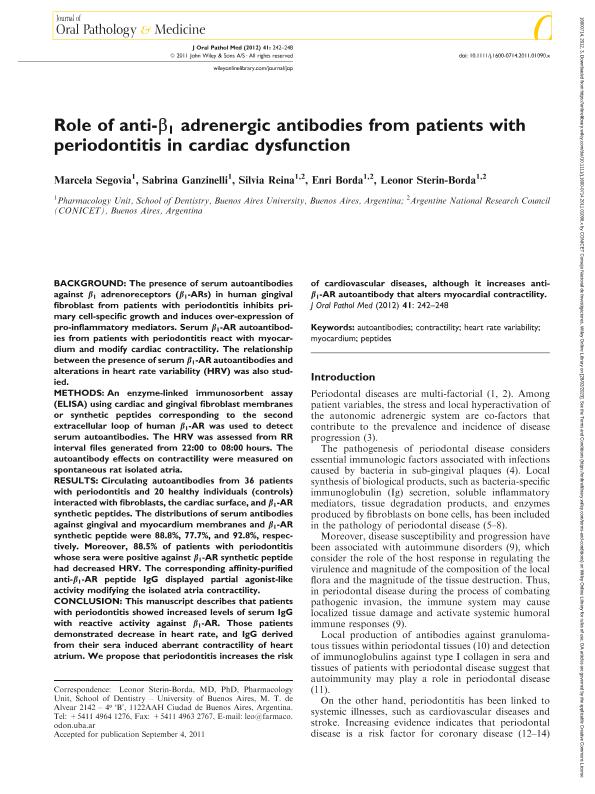Artículo
Role of anti-β 1 adrenergic antibodies from patients with periodontitis in cardiac dysfunction
Segovia, Marcela; Ganzinelli, Sabrina Belen ; Reina, Silvia Lorena
; Reina, Silvia Lorena ; Borda, Enri Santiago
; Borda, Enri Santiago ; Sterin Borda, Leonor
; Sterin Borda, Leonor
 ; Reina, Silvia Lorena
; Reina, Silvia Lorena ; Borda, Enri Santiago
; Borda, Enri Santiago ; Sterin Borda, Leonor
; Sterin Borda, Leonor
Fecha de publicación:
03/2012
Editorial:
Wiley Blackwell Publishing, Inc
Revista:
Journal Of Oral Pathology And Medicine
ISSN:
0904-2512
Idioma:
Inglés
Tipo de recurso:
Artículo publicado
Clasificación temática:
Resumen
Background: The presence of serum autoantibodies against β 1 adrenoreceptors (β 1-ARs) in human gingival fibroblast from patients with periodontitis inhibits primary cell-specific growth and induces over-expression of pro-inflammatory mediators. Serum β 1-AR autoantibodies from patients with periodontitis react with myocardium and modify cardiac contractility. The relationship between the presence of serum β 1-AR autoantibodies and alterations in heart rate variability (HRV) was also studied. Methods: An enzyme-linked immunosorbent assay (ELISA) using cardiac and gingival fibroblast membranes or synthetic peptides corresponding to the second extracellular loop of human β 1-AR was used to detect serum autoantibodies. The HRV was assessed from RR interval files generated from 22:00 to 08:00hours. The autoantibody effects on contractility were measured on spontaneous rat isolated atria. Results: Circulating autoantibodies from 36 patients with periodontitis and 20 healthy individuals (controls) interacted with fibroblasts, the cardiac surface, and β 1-AR synthetic peptides. The distributions of serum antibodies against gingival and myocardium membranes and β 1-AR synthetic peptide were 88.8%, 77.7%, and 92.8%, respectively. Moreover, 88.5% of patients with periodontitis whose sera were positive against β 1-AR synthetic peptide had decreased HRV. The corresponding affinity-purified anti-β 1-AR peptide IgG displayed partial agonist-like activity modifying the isolated atria contractility. Conclusion: This manuscript describes that patients with periodontitis showed increased levels of serum IgG with reactive activity against β 1-AR. Those patients demonstrated decrease in heart rate, and IgG derived from their sera induced aberrant contractility of heart atrium. We propose that periodontitis increases the risk of cardiovascular diseases, although it increases anti-β 1-AR autoantibody that alters myocardial contractility.
Palabras clave:
AUTOANTIBODIES
,
CONTRACTILITY
,
HEART RATE VARIABILITY
,
MYOCARDIUM
,
PEPTIDES
Archivos asociados
Licencia
Identificadores
Colecciones
Articulos(OCA HOUSSAY)
Articulos de OFICINA DE COORDINACION ADMINISTRATIVA HOUSSAY
Articulos de OFICINA DE COORDINACION ADMINISTRATIVA HOUSSAY
Citación
Segovia, Marcela; Ganzinelli, Sabrina Belen; Reina, Silvia Lorena; Borda, Enri Santiago; Sterin Borda, Leonor; Role of anti-β 1 adrenergic antibodies from patients with periodontitis in cardiac dysfunction; Wiley Blackwell Publishing, Inc; Journal Of Oral Pathology And Medicine; 41; 3; 3-2012; 242-248
Compartir
Altmétricas



